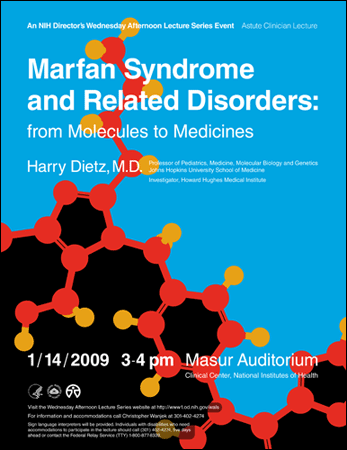An NIH Director's Wednesday Afternoon Lecture Series Event
![]() Sign up to receive email updates for NIH Clinical Center Astute Clinician Series
Sign up to receive email updates for NIH Clinical Center Astute Clinician Series
"Marfan Syndrome and Releated Disorders: from Molecules to Medicines"
Speaker: Harry Dietz, MD
Victor A. McKusick Professor of Medicine and Genetics
Institute of Genetic Medicine
Departments of Pediatrics, Medicine, Molecular Biology
and Genetics, and Neurosurgery
Johns Hopkins University School of Medicine
Investigator, Howard Hughes Medical Institute
Wednesday, Jan. 14, 2009
3 pm - 4 pm
Masur Auditorium
Clinical Center
National Institutes of Health
Visit the Wednesday Afternoon Lecture Series website.

Past Astute Clinician Lectures
The Astute Clinician Lecture Series
The Astute Clinician Lecture was established through a gift from the late Dr. Robert W. Miller and his wife, Haruko. It honors a US clinician-scientist who has observed an unusual clinical occurrence, and by investigating it, has opened an important new avenue of research.
Continuing Medical Education (CME) activities offered by NIH are jointly sponsored in partnership with The Johns Hopkins University School of Medicine Office of CME.
The WALS is intended for advanced students and practitioners in biomedical fields, healthcare professionals, and doctoral-level scientists who seek to update and broaden their understanding of contemporary biomedical research and the environment in which it is conducted.
Activity Description: The Wednesday Afternoon Lecture Series provides a mechanism to stay abreast of state-of-the-art biomedical and health research.
Intended Audience: All physicians, allied health professionals and non-clinical scientists, as well as the general public, are invited to attend the Wednesday Afternoon Lecture Series.
Objectives: After attending the activity, participants will be able to: (1) define options, alternatives, and new practices that will guide the conduct of research; (2) evaluate practical information presented about laboratory, clinical, and population-based research principles based on state-of-the-art scientific discovery and achievements; and (3) analyze information and opportunities to increase and improve collaboration among investigators and move scientific frontiers forward, especially to bridge areas of laboratory, translational, and clinical research.
Accreditation Statement: This activity has been planned and implemented in accordance with the accreditation requirements and policies of the Accreditation Council for Continuing Medical Education (ACCME) through the joint providership of Johns Hopkins University School of Medicine and the National Institutes of Health. The Johns Hopkins University School of Medicine is accredited by the ACCME to provide continuing medical education for physicians.
Credit Designation Statement: The Johns Hopkins University School of Medicine designates this live activity for a maximum of 39 AMA PRA Category 1 Credits™. Physicians should only claim credit commensurate with the extent of their participation in the activity.
Policy on Speaker and Provider Disclosure: It is the policy of The Johns Hopkins University School of Medicine that the speaker and provider disclose real or apparent conflicts of interest relating to the topics of this educational activity, and also disclose discussions of unlabeled/unapproved uses of drugs or devices during their presentation(s). The Johns Hopkins University School of Medicine OCME has established policies in place that will identify and resolve all conflicts of interest prior to this educational activity. Detailed disclosure will be made in the activity handout materials.
